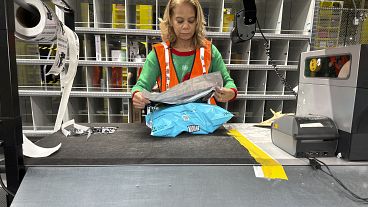Most companies do not provide enough details for researchers to understand paid influence.
The advertising libraries of 11 online platforms, including X, Meta and TikTok, do not provide enough insight into paid influence and commercial ads ahead of the EU election in June, according to a study carried out by non-profit organisations Mozilla and CheckFirst.
The ad repositories, which Very Large Online Platforms (VLOPs) are required to have in place under the EU’s platform rules, collect ad content and information about the intention of campaigns, giving users information into how commercial communications are used.
“We find a huge variation among the platforms, but one thing is true across all of them: none is a fully-functional ad repository and none will provide researchers and civil society groups with the tools and data they need to effectively monitor the impact of VLOPs on Europe’s upcoming elections,” the report says, adding that the tools were also difficult to find online.
The stress test, carried out by Mozilla in December 2023 and January of this year, looked at platforms designated as VLOPs under the Digital Services Act (DSA): AliExpress, Alphabet (Google Search and YouTube), Apple App Store, Bing, Booking.com, LinkedIn, Meta (Facebook and Instagram), Pinterest, Snapchat, TikTok, X, and Zalando.
The study found, among others, that Apple's web repository lacks important details needed to understand paid influence, such as ad targeting broken down by country. In the case of TikTok, the ad repository looks robust, but the study still encountered gaps and inaccuracies, whereas for Booking.com it appeared difficult to link ads on the platform to ads in the web repository, the document says.
Mozilla recommended that the platforms develop more advanced search tools to allow for more efficient research into advertisements, like filters and sorting options, as well as ensuring that the data is regularly updated. The report also calls on the European Commission to set up guidelines specific to ad repositories.
Guidelines
The EU Executive last month (26 March) published guidelines for platforms regulated under the DSA related to the elections. This focussed more on reinforcing internal processes such as setting up election teams and adopting mitigation measures linked to generative AI. Earlier this year (27 February), the EU institutions also agreed on new rules for political advertising, which included rules on clearly labelling political ads.
Some companies, including TikTok and Meta have explained the changes they are making ahead of the EU election; both are setting up online election centres to fight disinformation.
A spokesperson for the commission said that the online platforms' ad libraries should be easily accessible and allow users to search and query the repository using multiple criteria.
"Efforts should be made to ensure the information is accurate and complete. The repository should cover the entire period during which the advertisements were shown and continue for one year after the last display," the commission said.
The ongoing investigations into the compliance of X, TikTok and AliExpress also include "suspected shortcomings in the platforms’ ad repositories," the spokesperson added.



